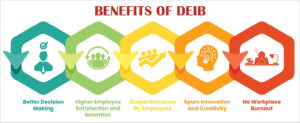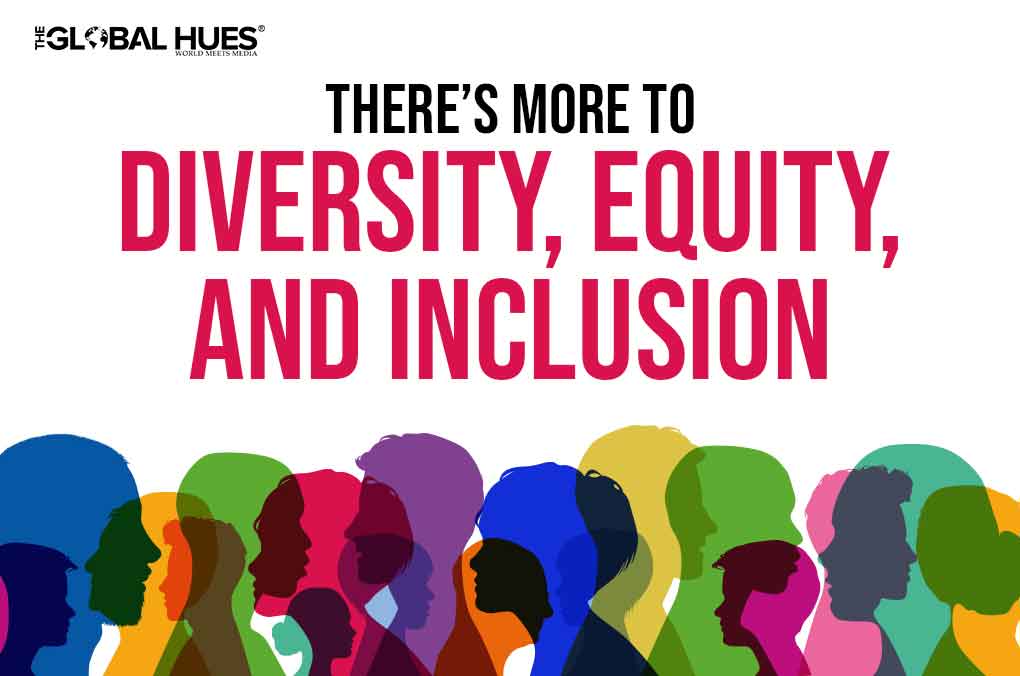We often hear the terms Diversity, Equity and Inclusion. But is there something we are missing here? Yes! We are…
When Vivek, a 42-year-old entrepreneur managing an e-commerce business, inquired his childhood friend Samarth, a 37-year-old businessman operating a digital marketing firm, about the keys to running a prosperous organisation with satisfied employees, the response he received brought a sparkle to his eyes.
Samarth responded, “By fostering diversity, equity, inclusion, and a sense of belonging within the organisation, you can build a happy atmosphere in your workplace.”
Intrigued, Vivek expressed his desire to delve deeper into the topic, transforming their simple conversation into an impromptu and enriching discussion.
It’s a team and its combined efforts which take a company to the next level. Therefore, attracting and retaining top talent is a significant challenge when building a successful organisation. To ensure employee satisfaction and loyalty, it is crucial to prioritise their sense of value, inclusivity, and respect. When we say this, we come across three powerful words- Diversity, Equity and Inclusion (DE&I). Implementing this strategy can provide several additional advantages that can give an organisation a competitive edge and contribute to its financial success.
While some organisations are moving mountains by adhering to DE&I policies for years, companies are adding ‘Belonging’ into their DEI strategies, resulting in the highest levels of connectedness among employees.
Diversity, Equity, Inclusion and Belonging are often used interchangeably but have different meanings and significance at different levels.
WHAT IS DEIB?
DIVERSITY

Diversity refers to the presence of differences that enrich the workplace. Examples of diversity include race, ethnicity, gender, age, sexual orientation, abilities, religion, socioeconomic status, and more. It recognises and values the unique & distinct qualities and perspectives that people bring with them.
It involves:
- Employing people belonging to a variety of backgrounds and experiences
- Making hiring strategies that focus on increasing the representation of underrepresented groups and greater gender diversity
- Creating flexible mandatory holidays
- Teams that embrace diversity and create an environment where employees feel valued and appreciated for their unique contributions
EQUITY
Equity entails ensuring that all individuals have equal opportunities to grow and succeed, regardless of their background. Equity also involves identifying and addressing biases and disparities and ensuring everyone has access to the resources and opportunities they need to reach their full potential.
It involves:
- Ensuring equal pay throughout the organisational hierarchy
- Establishing an executive team that embraces diversity in its composition
- Providing accessibility measures and necessary accommodations to support employees of all capabilities
- Promoting fair and equitable access to learning and development opportunities for all existing employees
INCLUSION
Inclusion involves creating a workplace culture where all individuals feel welcomed, respected, and valued. It involves the active engagement of the workforce from diverse backgrounds, ensuring their voices are heard, and their contributions are recognised and appreciated.
It involves:
- Organising team-building activities
- Offering gender-inclusive restroom facilities
- Prioritising the participation of all workers in company celebrations
- Establishing Employee Resource Groups (ERGs) to foster connections among employees who share similar experiences
BELONGING

The meaning of belonging goes deeper than appreciating the employee for their contribution to the organisation. Belonging in the workplace refers to an employee’s perception that their uniqueness is not only acknowledged but also valued by their company and its coworkers.
It involves:
- Ensuring that leaders steer clear of showing favouritism
- Offering equitable and transparent access to information
- Acknowledging and appreciating employees’ diligent efforts
- Embracing and valuing employees as holistic individuals
Why Belonging?
To put it simply, when employees feel that they belong at work, they are more likely to:
- Look forward to coming to work
- Express that their workplace is safe and enjoyable
- Believe people are treated equally regardless of their race
- Stay at their company for a longer time
HOW TO ACHIEVE DEIB IN THE WORKPLACE?
-
Engage In The Collective Celebration Of Various Holidays
In an era characterised by diverse backgrounds and cultures, recognising and embracing religious diversity in the workplace has gained importance. You can show that you care about your employees by celebrating different cultural events with them. Whether it involves giving employees a day off or celebrating within the office premises, it is crucial to honour the traditions and celebrations of employees belonging to different backgrounds.
You can also encourage employees to have open discussions about religious diversity. This can also serve as an opportunity for you to raise awareness and expand your knowledge, both individually and as a team, about celebrations that might have otherwise been unfamiliar to you.
-
Establish Employee Resource Groups (ERGs)
Employee Resource Groups (ERGs) are groups led by employees to promote the representation of underrepresented groups in the organisation. You can start ERGs for:
- Employees with disabilities
- Women-focused ERGs
- LGBTQ+ employees
- Neurodiverse employees
- New hires
- Sustainable practices and many more
-
Adopt Anonymous Recruitment Practices
That’s how you can reduce the risk of bias in the recruitment process. Studies have shown that anonymous recruitment is far better when it comes to taking hiring decisions as it is solely based on hiring the candidates based on their experience.
While evaluating candidate applications, eliminate any details that could provoke biases, such as photos, names, or gender. Instead, focus solely on the applicant’s experience and qualifications. This approach will assist you in selecting the most suitable candidate while also teaching you about your own unconscious biases.
-
Allocate Resources For The Training And Development Of Diverse Employees
As we said at the beginning, it’s a team that propels a company to reach new heights. Employees are the biggest asset of an organisation. Hence, invest in them. Provide cultural sensitivity and inclusion training to your team to foster an understanding of how to honour each other’s diversities. It is equally important to invest in their professional training.
Engage in discussions with each employee to understand and carve their career trajectory and offer the necessary training, development programs, and assistance to help them achieve their goals. You also need to make sure that you give equal support and access to resources for every employee to facilitate their growth in the workplace.
-
Enhance Awareness Of DEIB Matters In The Workplace
You can’t reach anywhere if employees do not understand DEIB’s importance. Hence prioritise bringing employees together to foster a deep understanding of inclusion and diversity issues in your company. Conduct seminars, company-wide briefings, or individual discussions between managers and their teams. Utilise this opportunity to communicate the objectives you have established for diversity, equity, inclusion, and belonging.
Also Read: How to help your team reduce the workplace anxiety?
-
Conduct Surveys To Gather Feedback From Employees
Now that you have spread awareness of DEIB matters, it is also important to take employees’ feedback. By doing this, you gauge your progress towards diversity and inclusivity goals, as well as assess the effectiveness of your company’s initiatives towards DEIB.
Hence, it is crucial to conduct regular surveys among employees to gather their perspectives on DEIB goals and the progress being made. Do this regularly to gain insights into employee satisfaction regarding the company’s efforts in this area.
BENEFITS OF DEIB

Having gained a profound understanding of how to attain Diversity, Equity, Inclusion, and Belonging, let us now shift our attention to the advantages it offers:
-
Better Decision Making
By promoting DEIB, you give your employees a seat at the table. This feeling of being valued makes them express their viewpoints. They become more inclined to actively participate and share their perspectives. Providing employees with a secure & safe environment to voice their ideas or opinions across various subjects, ranging from new products to new markets, results in a broader range of perspectives when making decisions or resolving problems.
-
Higher Employee Satisfaction and Retention
Retaining talent is as difficult as hiring them. If DEIB is done correctly and with utter honesty, it can significantly contribute to enhanced employee satisfaction and thus retention. By building diverse and inclusive teams, you can foster a sense of belonging that promotes employee retention. Happy and satisfied employees are less inclined to leave & seek alternative opportunities. Moreover, considering the costs associated with training new hires, the company may save money in the long term.
Also Read: Decoding the Toxic Work Culture: A Blame Game Between Employers and Employees
-
Outperformance by Employees
Compared with a less diverse team, a team comprising diverse members can be more proficient in recognising new & potential opportunities and venturing into different markets due to their awareness of many other options. Their resourcefulness can help in identifying untapped potential that will ultimately propel growth for the organisation.
-
Spurs Innovation and Creativity
As said by Theodore Levitt, “Creativity is thinking up new things. Innovation is doing new things.” Hence both stay important. In the fast-paced and ever-evolving marketplace, companies must adapt to state-of-the-art trends. Having a diverse workforce equipped with a range of perspectives and experiences enables better identification of opportunities and the creation of innovative solutions. By valuing and respecting the distinct viewpoints of all employees, Diversity, Equity, and Inclusion (DE&I) practices enable businesses to access a broader array of ideas and solutions.
-
No Workplace Burnout
Employees love working in a workplace wherein they feel more respected, valued and appreciated. Creating a workplace that follows DEIB contribute to reducing the occurrence of burnout by fostering a positive organisational culture. Additionally, this approach can enhance employee morale and motivation.
The Bottom Line
This brings us to the conclusion that Diversity, Equity, Inclusion and Belonging are must in an organisation. Whether you’re recruiting new talent or enhancing your leadership skills, considering DEIB can bring about groundbreaking results for both your employees and your business.




